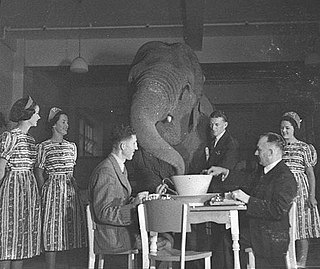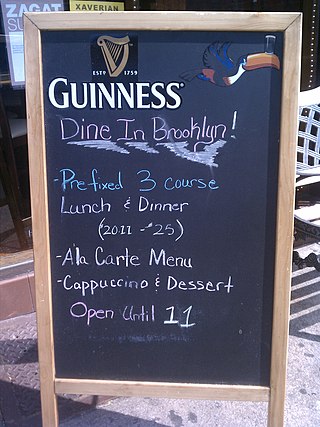Related Research Articles

Rhyming slang is a form of slang word construction in the English language. It is especially prevalent among Cockneys in England, and was first used in the early 19th century in the East End of London; hence its alternative name, Cockney rhyming slang. In the US, especially the criminal underworld of the West Coast between 1880 and 1920, rhyming slang has sometimes been known as Australian slang.

A backronym is an acronym formed from an already existing word by expanding its letters into the words of a phrase. Backronyms may be invented with either serious or humorous intent, or they may be a type of false etymology or folk etymology. The word is a portmanteau of back and acronym.
An idiom is a phrase or expression that largely or exclusively carries a figurative or non-literal meaning, rather than making any literal sense. Categorized as formulaic language, an idiomatic expression's meaning is different from the literal meanings of each word inside it. Idioms occur frequently in all languages; in English alone there are an estimated twenty-five thousand idiomatic expressions. Some well known idioms in English are spill the beans, it's raining cats and dogs, and break a leg.
A cliché is a saying, idea, or element of an artistic work that has become overused to the point of losing its original meaning, novelty, or figurative or artistic power, even to the point of now being bland or uninteresting. In phraseology, the term has taken on a more technical meaning, referring to an expression imposed by conventionalized linguistic usage.
Bloody, as an adjective or adverb, is an expletive attributive commonly used in British English, Irish English, and Australian English; it is also present in Canadian English, Indian English, Malaysian/Singaporean English, Hawaiian English, South African English, and a number of other Commonwealth of nations. It has been used as an intensive since at least the 1670s. Considered respectable until about 1750, it was heavily tabooed during c. 1750–1920, considered equivalent to heavily obscene or profane speech. Public use continued to be seen as controversial until the 1960s, but the word has since become a comparatively mild expletive or intensifier.

The expression "the elephant in the room" is a metaphorical idiom in English for an important or enormous topic, question, or controversial issue that is obvious or that everyone knows about but no one mentions or wants to discuss because it makes at least some of them uncomfortable and is personally, socially, or politically embarrassing, controversial, inflammatory, or dangerous. The metaphorical elephant represents an obvious problem or difficult situation that people do not want to talk about.
Folk etymology – also known as (generative) popular etymology, analogical reformation, (morphological)reanalysis and etymological reinterpretation – is a change in a word or phrase resulting from the replacement of an unfamiliar form by a more familiar one through popular usage. The form or the meaning of an archaic, foreign, or otherwise unfamiliar word is reinterpreted as resembling more familiar words or morphemes.

An eggcorn is the alteration of a word or phrase through the mishearing or reinterpretation of one or more of its elements, creating a new phrase which is plausible when used in the same context. Thus, an eggcorn is an unexpectedly fitting or creative malapropism. Eggcorns often arise as people attempt to make sense of a stock phrase that uses a term unfamiliar to them, as for example replacing "Alzheimer's disease" with "old-timers' disease", or William Shakespeare's "to the manner born" with "to the manor born". The autological word "eggcorn" is itself an eggcorn, derived from acorn.
Australian Aboriginal English is a set of dialects of the English language used by a large section of the Indigenous Australian population as a result of the colonisation of Australia. It is made up of a number of varieties which developed differently in different parts of Australia, and grammar and pronunciation differs from that of standard Australian English, along a continuum. Some of its words have also been adopted into standard or colloquial Australian English.
"Break a leg" is an English-language idiom used in the context of theatre or other performing arts to wish a performer "good luck". An ironic or non-literal saying of uncertain origin, "break a leg" is commonly said to actors and musicians before they go on stage to perform or before an audition. Though a similar and potentially related term exists in German without theatrical associations, the English expression with the luck-based meaning is first attributed in the theatre in the 1930s or possibly 1920s.
"Mind your own business" is a common English saying which asks for a respect of other people's privacy. It strongly suggests that a person should stop interfering in what does not affect themselves. Contextually, it is often used in an argument or dispute as a remark to refute, reject or discourage other peoples' concerns or comments. Its acronym is MYOB.
Poglish, also known as Polglish and Ponglish, is a blend of two words from Polish and English. It is the product of macaronically mixing Polish- and English-language elements within a single speech production, or the use of "false friends" or of cognate words in senses that have diverged from those of the common etymological root. Such combining or confusion of Polish and English elements, when it occurs within a single word, term, or phrase, may, inadvertently or deliberately, produce a neologism.

An idiom is a common word or phrase with a figurative, non-literal meaning that is understood culturally and differs from what its composite words' denotations would suggest; i.e. the words together have a meaning that is different from the dictionary definitions of the individual words. By another definition, an idiom is a speech form or an expression of a given language that is peculiar to itself grammatically or cannot be understood from the individual meanings of its elements. For example, an English speaker would understand the phrase "kick the bucket" to mean "to die" – and also to actually kick a bucket. Furthermore, they would understand when each meaning is being used in context.
Yes and no, or similar word pairs, are expressions of the affirmative and the negative, respectively, in several languages, including English. Some languages make a distinction between answers to affirmative versus negative questions and may have three-form or four-form systems. English originally used a four-form system up to and including Early Middle English. Modern English uses a two-form system consisting of yes and no. It exists in many facets of communication, such as: eye blink communication, head movements, Morse code, and sign language. Some languages, such as Latin, do not have yes-no word systems.
Swardspeak is an argot or cant slang derived from Taglish and used by a number of LGBT people in the Philippines.
Baka means "fool", or "foolish" and is the most frequently used pejorative term in the Japanese language. The word baka has a long history, an uncertain etymology, and sociolinguistic complexities.
"Cold shoulder" is a phrase used to express dismissal or the act of disregarding someone. Its origin is attributed to Sir Walter Scott in a work published in 1816, which is in fact a mistranslation of an expression from the Vulgate Bible. There is also a commonly repeated incorrect folk etymology.
The Miami accent is an evolving American English accent or sociolect spoken in South Florida, particularly in Miami-Dade county, originating from central Miami. The Miami accent is most prevalent in American-born Hispanic youth who live in the Greater Miami area.

DoggoLingo is an Internet language that is created from word conversion, meme lexicon, and onomatopoeia. Emerging in the 2010s, DoggoLingo is implied to be a dog's own idiom, and is presented as a canine's thought process. Elyse Graham, assistant professor at Stony Brook University, describes DoggoLingo as "upbeat, joyful, and clueless in a relentlessly friendly way".
References
- ↑ "Meanings and origins of Australian words and idioms - Australian National Dictionary Centre - ANU". Archived from the original on 25 May 2017. Retrieved 30 April 2017.
- ↑ "Tony Beyer". Manukau in Poetry. Manukau Libraries. Archived from the original on 14 October 2008. Retrieved 13 June 2008.
- ↑ Walsh, Robert; Eliakim Littell; John Jay Smith (2005) [1836]. "Scene in Calcutta". Museum of Foreign Literature, Science and Art. Philadelphia: E Little. p. 590. First published in The New Monthly Magazine
- ↑ Ludowyk, Frederick. "All my eye and Betty Martin! The folk etymology of some popular idioms". OzWords (October 1996). Australian National University : Australian National Dictionary Centre. Archived from the original on 11 October 2008. Retrieved 13 June 2008.
- ↑ Seal, Graham (1999). The Lingo: Listening to Australian English. UNSW Press. p. 107. ISBN 978-0-86840-680-0 . Retrieved 13 June 2008.
- ↑ Wajnryb, Ruth (2008). Cheerio Tom, Dick and Harry: Despatches from the Hospice of Fading Words. Allen & Unwin. p. 79. ISBN 978-1-74114-993-7 . Retrieved 13 June 2008.
- ↑ "Fish Trout: Children's Folklore". National Library of Australia. Archived from the original on 23 July 2008. Retrieved 13 June 2008.
- ↑ Chesterton, Ray (9 October 2006). "Aussie lingo facing extinction". News Ltd. Retrieved 13 June 2008.[ dead link ]